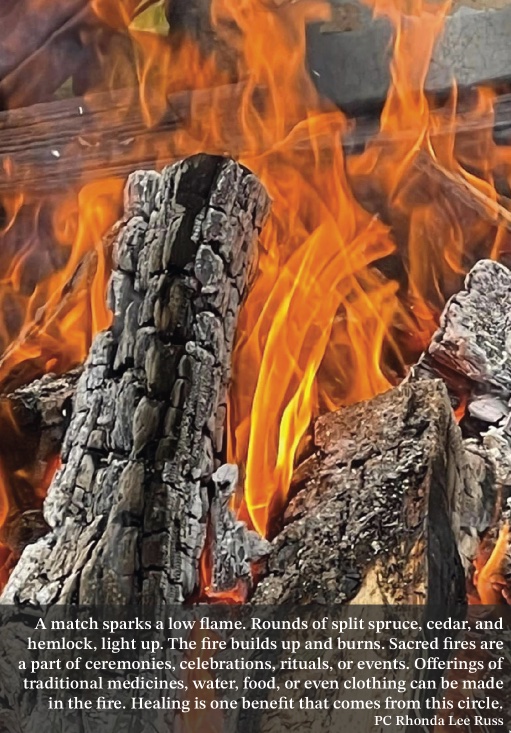| Handling Grief Through Ceremony - Ways of Knowing |
 |
| Written by Rhonda Lee Russ |
| 19 April 2023 |
|
Cedar and spruce embers burn low on a spent sacred fire on a rainy afternoon. Curls of smoke; with the bared emotions and prayers of community members, rise from the hot coals. Boughs of cedar, bits of sweetgrass, sage, tobacco, and even lavender lay on soot-blackened rocks. The sacred fire burns for hours surrounded by Elders, Cultural Knowledge Keepers, drummers and singers, all providing comfort, warmth and healing. Grief follows a death, a breakup, or any sudden change in one’s life. Psychiatrist Elisabeth Kubler-Ross developed a five-stage grief theory to explain complex emotions associated with the grief process. The different stages of grieving are denial, anger, bargaining, depression and acceptance. Denial is the first stage that helps ease our emotions, pain, sudden disconnection and helps us process what we have lost and miss. In missing and yearning for someone or something, we suffer shock and have to get used to the new situation in our attempts to move ahead, as painful as it may be. Anger is next in the grieving. Our emotions are strong and despair and anger arise as we deal with our vulnerabilities, our fears, confusion and frustrations over the loss we have experienced. We turn inward, away from those who would comfort us, sit by us, and love us in our sadness. Anger is natural and is easily moved through with understanding and care. Bargaining follows anger. In the disbelief of our loss, we begin to speak to Creator, God or another higher power in the hopes of changing our situation, of worrying and dealing with the regrets, and asking for a do-over, what if’s, and saying things like “I’ll be better“ or “I will do better” or begging for “one more day” or “one more chance,” even though we know there can be no change in our loss. Depression is the next step as we continue to cope with our new situation. Our sadness takes over and overwhelms us like heavy clouds in the sky. Emotions begin to round out, our minds become clearer, order begins to take over and the loss is present and clearer than ever before. We turn inwards, we have a tendency to be alone, feel less social, and vulnerable in our grief. Isolation and tears take over. Acceptance is the final stage of grief. The loss no longer stings like it did in the beginning. We accept the loss and have a clearer outlook on our reality. We may still feel sad and miss the person or thing we have lost. We do not turn to the four earlier stages. We move towards healing and an adjusted view of our reality. People, like their emotions, are all different. Some may skip, move through, or even fail to experience all stages of grief. There are also no set time spans for these stages. Ceremony and cultural healing methods are only one way to manage grief, especially nowadays. It was not long ago that Indigenous ceremonies were legally banned across the country. Over the years, changes to the Indian Act have resulted in the resurgence and practice of ceremonies. Residential and Indian Day Schools also forced Indigenous people to deny their feelings and reject their culture and heritage. Stories of resistance have emerged as ceremonies, songs, regalia, stories and teachings were kept secret. Ceremonies were quietly taught or secretly practiced away from prying church and police eyes. End of life, death protocols, and ceremonies are important so that Nations can grieve in a culturally relevant manner. In sharing some general protocols, traditional teachings are best practiced in person. Indigenous cultures are not the same. Ceremonies have specific protocols that only a local Elder or Cultural Knowledge Holder can share. It is also recommended to bring a small gift for the Elder or Cultural Knowledge Holder and bring food to share the ceremony. As an Indigenous person or ally in the circle it is respectful to ask for guidance, watch, listen, and come with an open mind and heart. Unless otherwise noted, all ceremonies are open for the community to attend. These are just guidelines and as always, don’t be afraid to ask questions about protocols and expectations. Cultural ceremonies like the sacred fire held for grieving families can be requested by any community member by calling the XaaydaGa Dlaang Society Haida Wellness Society at Xaaynangaa Naay House of Life at 250-559- 4610, the Niislaa Naay Health Society Healing House at 250-626-3911 or the Gwaay.yay Guudang.ngaay Hltaanawa Islands Wellness Society at 250- 559-4743. If you or someone you love is suffering from grief and loss, please contact your health care provider(s). This should not be used as a substitute for professional diagnosis and treatment. |










